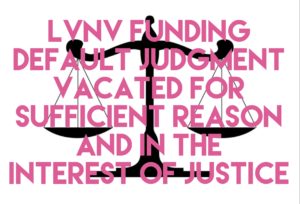By: Robert J. Nahoum

A default judgment is a court judgment awarded automatically to the Plaintiff (the party suing) without a trial. Default judgments are awarded because the defendant (the party being sued) failed to timely appear and defend the lawsuit.
In the debt collection context, default judgments are a debt collector’s bread and butter. Between sixty and ninety-five percent of all consumer debt collection lawsuits are estimated to result in default judgments.
Fortunately, New York courts have recognized that default judgments are highly questionable particularly due to the pervasiveness of improper service of process. For this reason, it is generally uncomplicated to have the default judgment vacated. To do so an order to show cause must be filed with a sworn affidavit from the defendant. The affidavit must show that the defendant was never served or that (1) the defendant has a reasonable excuse for default (like he or she was never received the summons and complaint); and (2) the defendant has a defense to the case (like he or she doesn’t owe all or part of the debt). More times than not, the order to show cause will be granted and the default judgment will be vacated.
In one recent case, a consumer brought an order to show cause to vacate a default judgment won by the infamous junk debt buyer LVNV Funding but failed to demonstrate a reasonable excuse for her default or a meritorious defense to the case. Nevertheless, Judge Ignatius Muscarella of the District Court of Nassau County First District vacated the judgment and restored the case to the civil calendar “for sufficient reason and in the interest of justice. The underlying cause of action arose from an assigned debt. Absent competent proof of the underlying debt, the alleged assignment, and the giving of notice of assignment, there are questions with respect the merits of the plaintiffs default judgment.â€
Debt collection lawsuits brought by junk debt buyers like LVNV Funding differ significantly from those brought by original creditors because junk debt buyers often lack the proof needed to win the case. In a debt collection lawsuit, the Plaintiff always has the burden to prove that the Defendant is responsible for the debt. To meet this burden, a junk debt buyer must prove that (1) it has the right to sue (called “standingâ€); (2) the debt is attributable to the defendant; and (3) the amount sued for is correct. It is never the burden of the Defendant to prove that he or she does not owe the debt.
To prove that a debt buyer owns your debt (“standingâ€), it must show how it came to acquire it. The sale of a debt from a creditor to a debt buyer or from one debt buyer to another is memorialized through an “assignment†in which the original creditor “assigns†ownership (and the right to collect the debt) to a new creditor. To be valid, the assignment must sufficiently identify the particular debt.
In this case, Judge Muscarella was apparently so suspicious of LVNV’s standing that vacatur of the default judgment was appropriate for “sufficient reason and in the interest of justiceâ€.
If you need help settling or defending a debt collection law suit, stopping harassing debt collectors or suing a debt collector, contact us today to see what we can do for you. With office located in the Bronx, Brooklyn and Rockland County, the Law Offices of Robert J. Nahoum defends consumers in debt collection cases throughout the Tristate area including New Jersey.
The Law Offices of Robert J. Nahoum, P.C
(845) 232-0202
www.nahoumlaw.com
info@nahoumlaw.com
